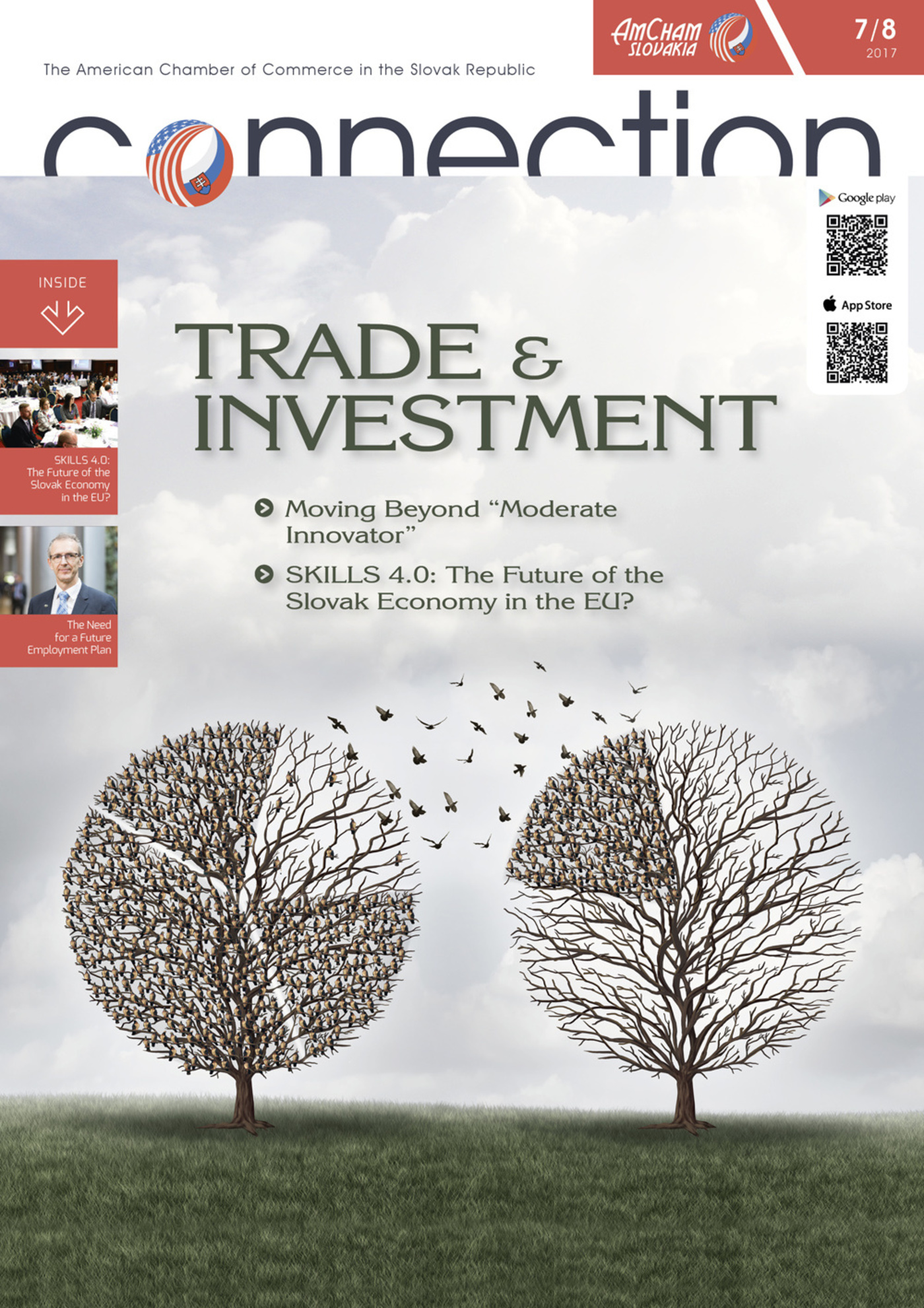How would you define the innovation potential of a country and what determines it?
The easiest way to determine it is to look at the quality of universities, availability of business and technical talent, the number and size of R&D-heavy companies and technology startups and whether or not innovation is among the key priorities of the government. So the most important indicators to measure the innovation potential of a country include factors such as the amount of R&D funding – both private and public, the number of patents filed or the venture capital activity.
Potential means having the capacity to develop into something in the future. Slovakia is currently considered by the European Innovation Scoreboard to be a “moderate innovator”, significantly lagging behind the EU average when it comes to innovation performance. But I believe we have the potential to be among innovation leaders. I see no reason why Slovakia could not become a country where disruptive products, new and better services and processes are being created.
What are the key elements of a society which values and actively promotes innovation? Is it more about the existing culture or about creating the right environment through policy regulations?
A society actively promoting innovation is entrepreneurial, values education, private initiative and accepts failure. Of course, it takes time for any society to evolve and change. Both private sector initiatives as well as government policies have an important role to play – as we can see in all successful innovation ecosystems – from Silicon Valley to Israel. The aim of public intervention is to support education and finance primary research, lower risks for the private sector in potentially disruptive ventures and trigger private investment.
Slovakia is the world leader in per capita car production. To what extent is this an advantage that can help attract innovative ideas in the automotive and related sectors and to what extent does it present a potential danger for the economy?
Israel barely produces any cars in the country, but the country is a global automotive powerhouse. And that’s thanks to the excellent R&D base and a plethora of startups whose technologies are relevant for the automotive sector. Israeli startup in autonomous driving Mobileye was recently acquired by Intel for 15 billion USD. Large OEMs (Original Equipment Manufacturers) have their innovation labs either in their home countries or in high-tech hotbeds such as Silicon Valley or Tel Aviv. So car production is certainly no prerequisite for bringing automotive R&D into the country. It can help attract the attention of decision-makers at the headquarters of the car manufacturers but a lot of work is still ahead – the government needs to be investing heavily into the research base and the entire tech ecosystem in the long term.
Slovakia has the highest risk of job loss due to automation from all OECD countries – so if we don’t manage to transform the education system and adapt to the coming changes, our economy will be in trouble.
In a recent article, The Financial Times describe the ongoing transformation of the Slovak economy dubbing Bratislava and other Central European cities “The Danube Valley”. What is your take on this optimistic perspective?
We have no other choice but to work together with neighboring regions which share a similar legacy, geographical proximity and a rapid growth of our startup scenes. Together, we are more relevant globally – we are a much bigger market and we have a stronger pipeline of amazing technology companies. I am an optimist; I believe this region has the potential to become the hottest place for startups in Europe, provided that we work together and connect our ecosystems.
From your experience at the Embassy of Slovakia in Washington, D.C., how are Slovak companies perceived in the United States? What kind of image does Slovakia, or the Central European region have?
Some of our companies such as ESET are well-known in the United States as well as some of our athletes, but Slovakia is way too small to have an image in the U.S. Several years ago, when I was still with the Embassy, we started an initiative called We4startups in Silicon Valley together with the International Visegrad Fund. The idea was to present the Visegrad region and the best startups all four countries had to offer. The impact was much bigger than any initiative of an individual V4 country before. So I believe that together we can build a positive image of CEE countries in the U.S. on the basis of innovation and new technologies, something that the Nordic countries have been very successful at. The Nordic countries opened their joint Nordic Innovation House in Palo Alto years ago. I think joint V4 or Danube Valley activities in Silicon Valley and elsewhere make a lot of sense.
What are the biggest obstacles Slovak companies face when entering the US market?
The first obstacle is psychological – many Slovak companies with great products are just too concerned about the size and competitive nature of the U.S. market. The second is regulatory – depending on the product the company is selling it can face a lot of regulatory hurdles in terms of approval processes, licensing, localization, etc. There were obviously big hopes in TTIP, which was supposed to eliminate a lot of these entry barriers, but this is all on hold, to put it optimistically. And the third important obstacle is the lack of business development capacity. Companies just don’t invest enough resources in finding the right partners to help develop their business in the US. And there are Slovaks doing amazing things all around the United States, who are just one phone call away and ready to help, many times pro bono. Also, the Slovak American Foundation has a great program called US Connections, helping Slovak startups expand on the U.S. market.
You have also served as a Commercial Counselor at the Slovak Embassy in Tel Aviv. Israel is a country with a population size comparable to that of Slovakia. The country is globally recognized for its thriving startup ecosystem and it also happens to be the leading country in research and development investment. What lessons from the Israeli experience could be potentially applied in Slovakia?
The thriving startup ecosystem and the high quality of research and development are very much interconnected. Strong R&D has a direct impact on the number of tech startups established on and off universities. So this is the first lesson – invest into science and research, it will pay back. The second lesson is a strong involvement of the government – the idea of government support is to take on risks where they are too big for the private sector, but not the upside if a venture succeeds. Government intervention in Israel always takes place in conjunction with the private sector – the government should not do parallel activities to the private sector, but always in partnership. The third lesson is a political consensus that innovation is critical for the country’s future. This is translated into a strong institution with a strong mandate in innovation called the Innovation Authority (formerly the Office of the Chief Scientist).
If you could implement three “nudges” to help foster innovation in Slovakia, what would these be?
These are slightly more than nudges: the important role of the military in the innovation ecosystem in Israel is something we cannot quite replicate in Slovakia. But we could certainly have programs that motivate the defense establishment to cooperate with the tech community – for the benefit of both. The second one would be communication – regular informal discussions between the heads of relevant business and innovation agencies and the tech community would help both sides understand the motivations and limits of the other. And I am sure it would increase the impact and effectiveness of policies and programs. And the third one – let’s capitalize on the biggest asset Slovakia has abroad – our diaspora. We need to bring the excellent scientists from abroad back home or motivate them to work on joint projects with Slovak labs from where they are. And we need to start using the networks and business acumen of successful Slovak entrepreneurs and managers abroad to help Slovak companies grow and expand.
As the CEO of Neulogy, you are also involved in organizing StartupAwards.SK, the most recognized competition for innovative companies in Slovakia. What can we look forward to in this year’s edition?
StartupAwards has been at the very core of the Slovak startup ecosystem for the past seven years. We have witnessed a massive growth of the technology scene in Slovakia and the event is also trying to reflect that.
Last year, StartupAwards was expanded to include a full-day tech conference. We were also responding to the fact that there was no technology-focused conference with top quality content in Slovakia or the Czech Republic. This year, we have decided to launch a separate brand for the conference part – FutureNow. The conference will not only be about startups and for startups. We’ll also host founders of billion dollar companies, innovators and top executives of large European corporations.
What topics will FutureNow address?
The conference will look at the technological transformation of today’s world. We’ll look at the short to medium-term outlook: what technology changes will drive business, entrepreneurship and policies within the next 5-10 years?
Future mobility, internet of the future and future of government – these are the topics that will significantly impact the economies and societies of Central and Eastern Europe. Mobility and transportation are about to be disrupted in major ways and this will change the future of infrastructure and shift industry value chains and labor markets. Changes in the internet – from shared protocols and thin applications to blockchain and decentralized web – are creating opportunities for businesses from CEE. And looking at how technology is changing government can help our countries leapfrog Western Europe in specific areas – from startup support policies to e-government. So these are the major topics that we’ll be discussing at FutureNow this year.
Peter Kolesár, CEO of Neulogy and a member of the AmCham Board of Directors



Follow us